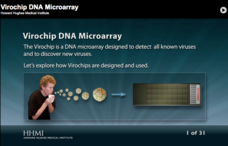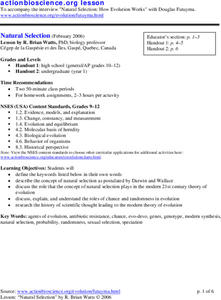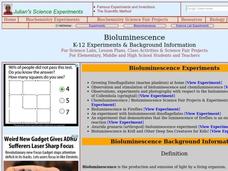Serendip
Using Molecular and Evolutionary Biology to Understand HIV/AIDS and Treatment
HIV mutates rapidly, making treatments challenging to find. Scholars learn about why it mutates so quickly and how scientists race to find treatments. The resource approaches the issue from both a molecular and evolutionary perspective...
Howard Hughes Medical Institute
Virochip DNA Microarray
Virochips detect and identify viruses at a higher rate than other tests. Show young scientists how Virochips work to identify existing viruses. They analyze results demonstrating mutations or the evolution of viruses and view videos...
Curated OER
Wait, They Can do it by Themselves?
Students recognize the concepts of evolution and natural selection as well as cladistics and phylogenetics. They observe the process of regeneration in a sea anemone to simulate asexual reproduction.
Curated OER
Natural Selection
Students use discussion questions, handout information and research topics to explore several issues related to natural selection and evolution. They examine Darwin's research on the finch and antibiotic resistance.
Curated OER
What Is Your Explanation for the Evidence?
Students encounter an interactive computer program activity designed as a diagnostic of student beliefs related to the theory of evolution. Students process the Hypercard cascades structured around a set of biological topics related to...
Curated OER
WHAT, IF ANYTHING, IS A ZEBRA?
Students read the essay, "What, If Anything, Is a Zebra?" following a teacher made reading guide. They investigate cladistics, shared derived characteristics, with further online research to enhance their study of evolution and...
Curated OER
Time Conceptualization
Students relate the number and length of generations in their living family members to the number of generations that have passed since specific events in recorded history. They then apply this time conceptualization to the number of...
Curated OER
Scavenger Hunt: Simulating Natural Selection
High schoolers simulate natural selection using pinto beans. In this biology lesson, students identify the factors affecting organism evolution. They record data from the experiment and formulate a conclusion.
Curated OER
Improving Literacy in the Biology Classroom via Genetic Disorders
Students read, write and reflect on Science articles, this approach will promote both literacy and critical thinking skills. Critical thinking skills learned in the science classroom from these activities will impact students in many...
Curated OER
Biosphere Socratic Questions
Students examine the origin of life on Earth and its evolution through geologic time by participating in a whole class discussion. They respond to prompts that lead them to conclusions about the interactions among the biosphere and the...
Curated OER
Charles Darwin
In this Charles Darwin worksheet, students fill in the blank with the correct answer. Students use the suggested text to complete statements about Charles Darwin, his expedition, and his development of his theory of evolution.
Curated OER
Introduction To Natural Selection
Seventh graders investigate the concept of natural selection and it relation to the theory of evolution. They create a definition for classification based upon looking at other subjects that are similar. The variation of species is...
Curated OER
Primate Evolution
In this evolution worksheet, students review 9 terms associated with the evolution of primates. Students place 6 terms into a crossword puzzle and 3 terms into fill in the blank statements.
Curated OER
Primate Evolution
In this primate evolution worksheet, learners use a diagram showing different primate adaptations to complete 3 short answer questions comparing human traits and primate traits.
Curated OER
Primate Characteristics and Exaptation
Students compare the features of gorilla to humans. In this biology lesson, students simulate adaptation using materials found in the classroom. They explain what exaptation means.
Curated OER
Natural Selection in Action
Students demonstrate natural selection through a lab activity. In this biology instructional activity, students explain how natural selection leads to speciation. They complete their lab report and discuss results in class.
Columbus City Schools
Get Your Organisms Organized
From large to small, show your class how to organize them all! Included within the guide is everything you need to take their knowledge of classification from the cellular to the species level. The worksheets focus on building vocabulary...
Curated OER
Hide and Survive: A Natural Selection Activity
Students explore the theory of natural selection given certain scenarios. In this biology lesson, students graph data taken from the experiment. They explain the factors that contribute to the survival of the fittest.
Curated OER
Biology Chapter 15 Word Search Puzzle
In this biology activity, middle schoolers look for the words that are related to the theme of the activity. They also work on the skills of spelling and word recognition.
Howard Hughes Medical Institute
Human Skin Color: Evidence for Selection
Skin color is controlled by at least six genes. Young scientists learn about skin colors through a documentary. They discuss the topics of pigment, natural selection, and vitamin D absorption. They apply their knowledge to higher order...
Curated OER
Lizard Lab
In this detailed and comprehensive multi-day activity, budding evolutionary biologists use real data from lizard populations in the Canary Islands to examine evolution and natural selection.
Curated OER
From Wolf to Dog
Students explain how dogs evolved from wolves based on the video. In this biology lesson, students research about breeding animals for specific traits. They interview dog owners and create a presentation about the dog.
Curated OER
Why Do People Fall in Love?
Students discuss human behavior, sexual selection and the underlying genetic and evolutionary reasons for mate selection. The, in groups, they rate the attractiveness of certain individuals and measure facial features for symmetry.
Curated OER
Bioluminescence
Students differentiate chemiluminescence from bioluminescence. In this biology lesson, students explain how fireflies and other animals emit light. They discuss the applications of engineered bioluminescence.

























